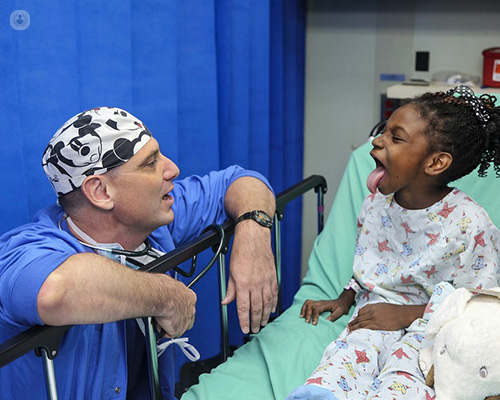


What is paediatrics?
Paediatricians and specialists in paediatric fields are doctors who manage medical conditions affecting young children, infants, and adolescents. Generally, paediatricians have a role in your child’s healthcare up to the age of 18.

What conditions does a paediatrician treat?
A child’s body and an adult’s body are of course different, as children are not simply ‘smaller adults’. Different conditions can affect children, which mean they require a doctor specialising in those particular medical conditions and the anatomy of the child. Paediatricians first qualify as doctors in the UK then go on to specialise in paediatrics.
Paediatricians are able to treat and manage a number of conditions, ranging from minor health problems like a cough or rash, to more serious or long-term conditions, including congenital defects, hormonal problems, developmental issues, and mental or behavioural problems.
As there are a number of conditions which affect children and which require specialist assessment, paediatricians work closely with doctors in other specialties, and can choose to further specialise in specific sub-specialties of paediatrics.
Which sub-specialties are included under paediatrics?
Paediatric sub-specialties in the UK include:
- Child mental health (assessing and managing mental health difficulties)
- Community child health (caring for vulnerable children e.g those with developmental problems, or those who are at risk of facing abuse)
- Neonatal medicine (caring for newborns or premature babies)
- Paediatric allergy, immunology and infectious diseases (infectious and allergic disorders, or problems with the immune system)
- Paediatric clinical pharmacology (the development of medicine for children and the use of medicine)
- Paediatric diabetes and endocrinology (hormonal conditions and disorders)
- Paediatric emergency medicine (acute healthcare)
- Paediatric gastroenterology, hepatology, and nutrition (conditions affecting the gastrointestinal tract and liver)
- Paediatric inherited metabolic medicine (inherited disorders affecting the body’s reactions)
- Paediatric intensive care medicine (treating critically ill children)
- Paediatric nephrology (disorders affecting the kidney)
- Paediatric neurodisability (acquired long-term conditions, or congenital disabilities)
- Paediatric neurology (conditions affecting the nervous system)
- Paediatric oncology (cancer)
- Paediatric palliative care (life-threatening conditions or life-limiting conditions)
- Paediatric respiratory medicine (conditions affecting the respiratory system)
- Paediatric rheumatology (inflammatory disorders)
Other paediatric areas, such as paediatric cardiology and paediatric surgery, are specialties within their own right.
When should my child see a paediatrician?
Your child will see a paediatrician throughout their young life until around the age of 18. If necessary, your paediatrician or GP will refer your child on to a specialist area for their treatment or assessment if it is considered that they need further assessment or more specialised management.